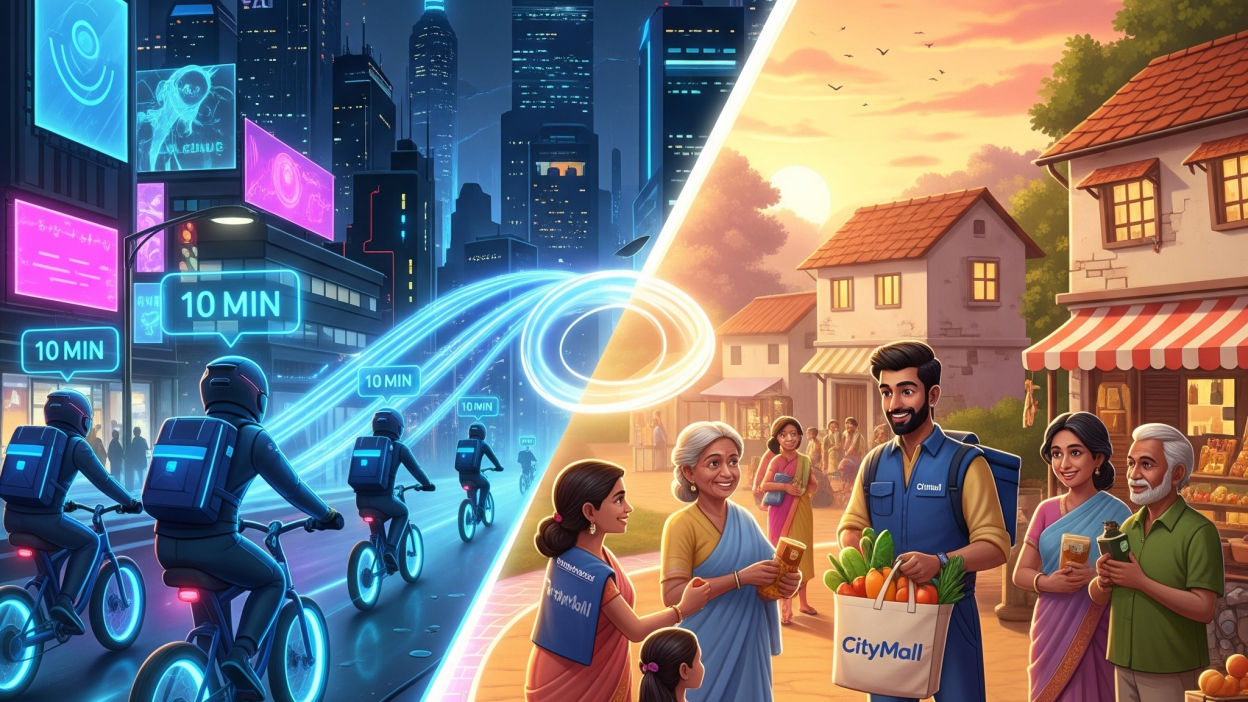India’s online grocery ecosystem has become one of the hottest battlegrounds in tech. On one side, ultra-fast delivery giants like Zepto, Blinkit (owned by Zomato), and Swiggy Instamart promise groceries at your doorstep in just 10 minutes. On the other, a quieter but equally powerful revolution is unfolding—one built not on speed, but on community, accessibility, and sustainability. CityMall, a social commerce-driven grocery platform, has just raised $47 million in fresh funding to scale this alternative model. Rather than racing against the clock, CityMall is racing to transform how India’s smaller towns and tier-2/3 cities shop online.
This article takes a deep dive into CityMall’s unique approach, why investors are betting big, how it challenges the ultra-fast delivery hype, and what its rise means for the future of Indian commerce.
The 10-Minute Delivery Hype: A High-Speed, High-Cost Race
The grocery wars in India have been dominated by the “10-minute delivery promise”, a model that prioritizes convenience for urban consumers. Platforms like Zepto and Blinkit have built micro-warehouses (“dark stores”) across cities to enable lightning-fast delivery.
While impressive on the surface, this model has serious challenges:
-
Unit Economics: Maintaining dark stores, delivery fleets, and logistics eats into margins, making profitability difficult.
-
Urban-Only Reach: Quick commerce works well in metros but is impractical in semi-urban or rural areas.
-
Environmental Costs: Ultra-fast logistics require constant deliveries, adding to emissions and packaging waste.
-
Pressure on Workforce: The “10-minute” culture creates enormous strain on gig workers, raising concerns around labor safety.
This is where CityMall’s contrarian playbook stands out—it isn’t about minutes; it’s about building a long-term, sustainable shopping habit for Bharat.
CityMall’s Differentiated Model
Founded in 2019 by Angad Kikla and Naisheel Verdhan, CityMall operates on a community commerce model. Instead of investing in dark stores, it taps into local entrepreneurs, called community leaders or “resellers,” who aggregate orders from their networks via WhatsApp and other social platforms.
How it Works
-
Community Leaders: Individuals (often homemakers, students, or small business owners) sign up to be CityMall leaders.
-
Order Aggregation: They collect grocery orders from friends, family, and neighbors through WhatsApp groups or direct outreach.
-
Bulk Fulfillment: CityMall consolidates these orders and delivers in bulk to the leader.
-
Last-Mile Distribution: Leaders distribute the products to their network, earning commissions.
This approach transforms shopping into a social experience while empowering local micro-entrepreneurs.
Why Investors Bet $47 Million on CityMall
CityMall’s recent Series C funding round of $47 million, led by Norwest Venture Partners, General Catalyst, and Jungle Ventures, shows that investors see a viable alternative to hyper-funded quick commerce.
Key Reasons for Investor Confidence:
-
Access to Untapped Markets: Tier-2 and Tier-3 cities represent the next 300 million internet users, largely ignored by ultra-fast delivery players.
-
Lower CAC (Customer Acquisition Cost): The community-led approach relies on trust networks, slashing marketing costs.
-
Sustainability of Model: Aggregated demand means bulk delivery, lowering logistics costs and improving margins.
-
Social Impact: By empowering local leaders, especially women, CityMall drives financial inclusion and grassroots entrepreneurship.
The CityMall Advantage: Beyond Speed
CityMall’s pitch is clear—it doesn’t need to win the speed race to succeed. Instead, it wins by addressing real needs of Bharat.
Benefits Over Quick Commerce:
-
Affordability: Bulk ordering reduces delivery costs, keeping prices competitive.
-
Trust: Buyers purchase through someone they know, overcoming the digital trust gap.
-
Employment: Thousands of community leaders earn supplemental income.
-
Scalability: CityMall doesn’t require dense urban infrastructure, making it easy to expand to smaller towns.
In many ways, CityMall is “flipping the script” on the grocery game.
The Road Ahead: Scaling to Bharat’s Heartlands
With the new funding, CityMall plans to:
-
Expand its community leader network from tens of thousands to hundreds of thousands.
-
Diversify beyond groceries into categories like FMCG, apparel, and electronics.
-
Invest in technology platforms for smoother order management, payments, and logistics.
-
Build AI-driven tools to help leaders predict demand and personalize recommendations.
The ambition? To become the “go-to commerce platform for Bharat”, a phrase that defines India’s rising small-town digital economy.
Challenges on the Horizon
Even with a promising model, CityMall faces hurdles:
-
Competition from Quick Commerce Giants: Deep-pocketed rivals could experiment with hybrid community-led strategies.
-
Supply Chain Complexity: Managing bulk orders across semi-urban geographies requires robust logistics.
-
Retention of Leaders: Keeping community leaders engaged long-term requires consistent incentives.
-
Digital Adoption Gaps: While WhatsApp penetration is deep, ensuring smooth digital payments and tracking remains a challenge.
The Bigger Picture: Rethinking India’s Grocery Future
CityMall’s rise underscores a critical shift: India’s grocery future won’t be one-size-fits-all.
-
Metros may continue to embrace ultra-fast delivery.
-
Tier-2/3 cities will lean toward trust-driven, community commerce.
-
Rural India may see hybrid offline-online models.
This layered approach ensures that India’s diverse population gets solutions that match their needs and realities.
Bullet Point Highlights
-
CityMall raised $47M Series C funding led by top global investors.
-
Operates on a community commerce model rather than quick delivery.
-
Empowers local entrepreneurs as resellers, many of whom are women.
-
Targets tier-2/3 cities where ultra-fast delivery is impractical.
-
Promises sustainable growth through lower costs and stronger trust networks.
-
Plans to expand categories and tech infrastructure with new capital.
-
Faces competition, but its differentiated model gives it a unique moat.
Beyond the 10-Minute Hype
CityMall’s $47M funding is not just a financial milestone—it’s a statement about the future of Indian commerce. The obsession with 10-minute groceries might dominate headlines, but sustainable, inclusive models like CityMall’s could prove more impactful in the long run.
By combining the power of community, affordability, and trust, CityMall is showing that speed isn’t everything. In fact, in the race to digitize India’s grocery ecosystem, the winner may not be the fastest—it may be the one that lasts the longest.



